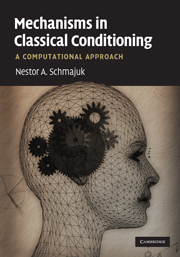Book contents
- Frontmatter
- Contents
- Preface
- Acknowledgments
- Abbreviations
- Part I Introduction
- Part II Attentional and associative mechanisms
- 2 An attentional–associative model of conditioning
- 3 Simple and compound conditioning
- 4 The neurobiology of fear conditioning
- 5 Latent inhibition
- 6 The neurobiology of latent inhibition
- 7 Creativity
- 8 Overshadowing and blocking
- 9 Extinction
- 10 The neurobiology of extinction
- Part III Configural mechanisms
- Part IV Attentional, associative, configural and timing mechanisms
- Part V Conclusion: mechanisms of classical conditioning
- References
- Author Index
- Subject Index
9 - Extinction
from Part II - Attentional and associative mechanisms
Published online by Cambridge University Press: 23 May 2010
- Frontmatter
- Contents
- Preface
- Acknowledgments
- Abbreviations
- Part I Introduction
- Part II Attentional and associative mechanisms
- 2 An attentional–associative model of conditioning
- 3 Simple and compound conditioning
- 4 The neurobiology of fear conditioning
- 5 Latent inhibition
- 6 The neurobiology of latent inhibition
- 7 Creativity
- 8 Overshadowing and blocking
- 9 Extinction
- 10 The neurobiology of extinction
- Part III Configural mechanisms
- Part IV Attentional, associative, configural and timing mechanisms
- Part V Conclusion: mechanisms of classical conditioning
- References
- Author Index
- Subject Index
Summary
In this chapter, we apply the SLG model to try to determine the mechanisms at work during extinction. Extinction refers to the phenomenon by which nonreinforced presentations of the conditioned stimulus (CS) after conditioning reduce the strength and frequency of the conditioned response (CR) to an arbitrarily small value. A large number of theories have been proposed to account for the extensive information available on extinction of classical conditioning. Associative models (e.g. Mackintosh, 1975; Rescorla & Wagner, 1972) assume that the phenomenon involves the weakening of the association between a CS and the unconditioned stimulus (US). In contrast, other approaches propose that extinction leaves the initial CS–US association intact. For instance, Pavlov (1927, Lecture XXII; see Robbins, 1990, page 236) provided a “new interpretation” of extinction in terms of a decrease in the activation of the cells triggered by the CS (CS representations), without changes in the connecting path between the CS cells and those cells excited by the US. For Rescorla (1974), extinction is the consequence of a decrease in the representation of the US, which controls both the CR and changes in the CS–US association. Hull (1943) suggested that extinction is the result of a “reactive inhibition”; a tendency not to repeat the CR when it is produced in the absence of the US.
Information
- Type
- Chapter
- Information
- Mechanisms in Classical ConditioningA Computational Approach, pp. 165 - 233Publisher: Cambridge University PressPrint publication year: 2010
